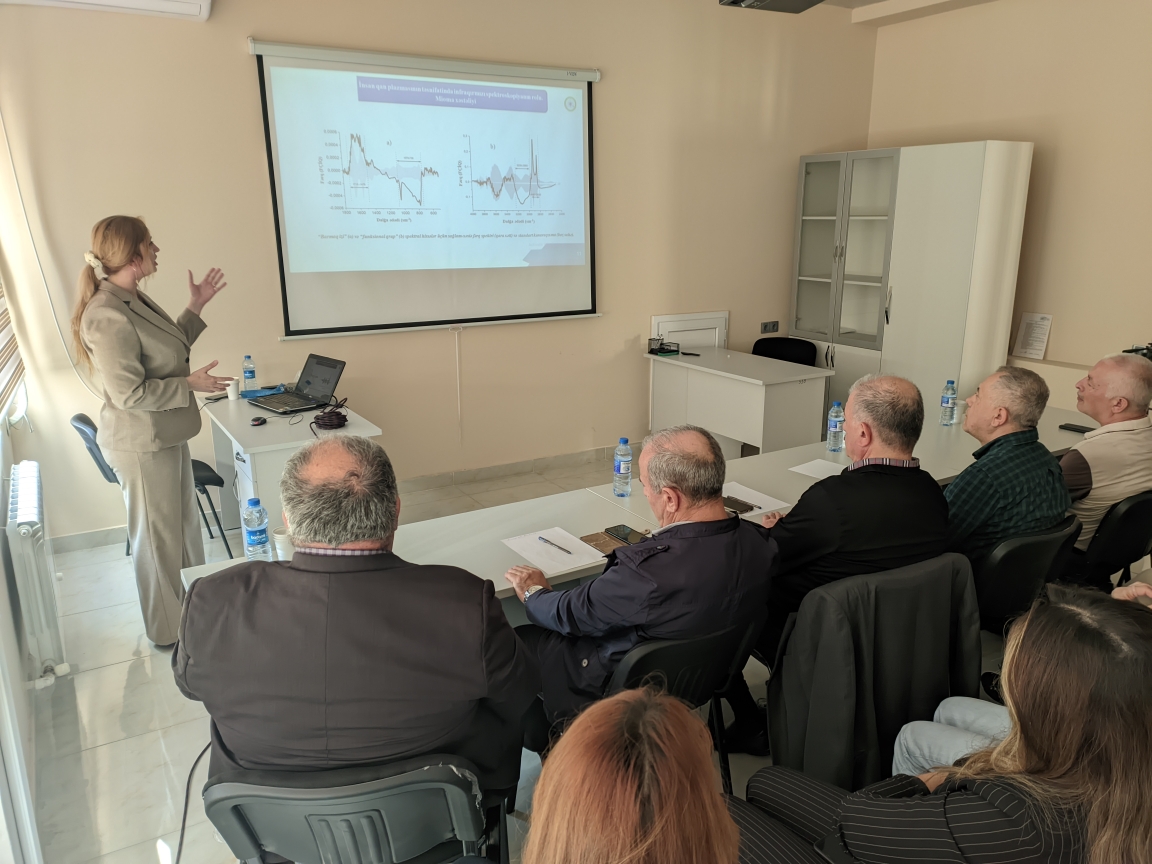
At the AR MSE Institute of Biophysics, a discussion was held on the dissertation work of Arzu Hətəmşah qızı Aydəmirova, a former PhD candidate and scientific researcher at the Laboratory of Structure, Dynamics, and Function of Biomolecules, specializing in 2406.01 – Biophysics. Her dissertation topic is titled "Development of a Cancer Diagnostic System Based on Infrared and Raman Spectra of Human Blood."
The discussion was chaired by the institute's executive director, Doctor of Biological Sciences Kərim Qasımov, who provided information about the candidate. He highlighted that Aydəmirova’s research holds high scientific value, employs innovative approaches, and that the topic is of great importance in modern medicine. According to Kərim Qasımov, Aydəmirova's work paves the way for important advancements in the development and application of new methods for cancer diagnostics.
Subsequently, Arzu Aydəmirova presented her dissertation titled "Development of a Cancer Diagnostic System Based on Infrared and Raman Spectra of Human Blood." She explained that the classification based on infrared spectra of plasma samples from healthy individuals and patients with lung carcinoma was successfully performed using the MetaboAnalyst 4.0 biomarker. With the help of artificial intelligence algorithms such as SVM, PLS-DA, and RF, it was possible to distinguish between the "healthy" and "lung carcinoma" groups with accuracies of 70-90%, 80-90%, and 80-80%, respectively. The results obtained from the study demonstrate that artificial intelligence systems built on FTIR spectra of blood plasma samples can be widely developed for identifying individuals at high risk. Such a screening method is considered minimally invasive, cost-effective, and fast.
In parallel, a second database was created from the infrared spectra of lipid fractions isolated from blood plasma samples. It is known that in cancer diseases, the cell-lipid composition undergoes significant changes, which can manifest in plasma membrane lipids. Given the low content of lipid components relative to other components in plasma lipids, the results obtained from the FTIR spectra of extracted lipid fractions provide complementary value for disease classification, thereby increasing the accuracy of the study.
By creating various nanostructured metal surfaces and using fibroin protein as a model on their surfaces, the study examined blood samples using various spectroscopic methods. It was found that to increase sensitivity, these methods could be widely applied to protein layers of different origins and could be significant factors in diagnosing various diseases and implementing appropriate treatments.
Following this, the Institute’s chief director, corresponding member of ANAS Oktay Qasımov, Doctor of Philosophy in Medicine Azad Əbdürəhimov, Doctor of Philosophy in Physics and Mathematics, Rasim Aslanov, Doctor of Philosophy in Biology Taleh Yusifov, and Doctor of Philosophy in Biology Sevinc Cəfərova asked the candidate questions and provided their suggestions and feedback.
Finally, A.Aydəmirova’s dissertation was recommended for extensive discussion at an inter-organizational seminar in the specialty 2406.01 – "Biophysics."